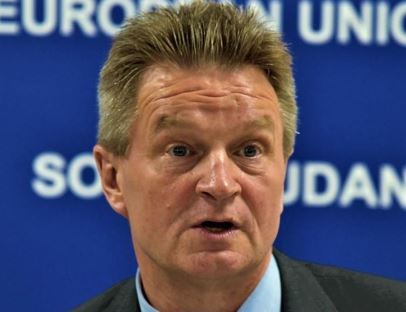The Ambassador of the European Union to the Republic of South Sudan on Thursday urged the parties to the 2018 revitalized peace agreement to use the same consensus they reached in September to extend the transitional to implement the agreement in the next two years.
Ambassador Timo Olkkonen who was speaking during the Reconstituted Joint Monitoring and Evaluation Commission (RJMEC) Plenary in Juba also stated that they expressed their disappointment with the decision to extend the transitional period for another two years.
“Nevertheless, the extension decision in September showed us that consensus can be forged and political decisions are taken quickly when the political will is there. We would hope there would be a similar interest in urgently addressing the key political questions put forward by the UN, AU, and IGAD already 15 months ago,” he said. “Many of these questions are essential for the plan on how to move ahead with the implementation of the agreement, such as the nature of the elections to be held, or the relation of the elections to the constitution.”
“We would expect to see a work plan for the implementation of the R-ARCSS with clear timelines and budgets with confirmed government funding,” Amb. Olkkonen added.
He noted that the implementation of the peace agreement is however not only a technical exercise.
“We cannot expect the independent Commissions to take the major crosscutting political decisions. Tackling technicalities without also addressing the key political issues would be putting the cart before the horse,” he stressed. “Taking the necessary political decisions does not require money, and they would be a sign of commitment and political will.”
According to the envoy, the European Union attached a lot of importance to the meeting of the RJMEC as the first one after the extension of the transitional period and is keen to learn if there is a new level of engagement by the Transitional Government to implement the R-ARCSS.
“We have been asking what is different this time. That was a question we asked also when the transitional period was extended the previous time in 2022,” Amb. Olkkonen asserted.
He said the European Union has been supporting the transition in South Sudan through our support to this August body (RJMEC), to CTSAMVM, to electoral preparations, legal reforms, and constitution-making, and to civil society dialogue.
“The extension means that the envisaged timelines for this support have also changed. Discussions need to be had and conclusions drawn what this will mean in practice for our continued engagement. Demonstrations of seriousness and political will would be helpful for these deliberations,” he concluded. “Lastly, I would like to congratulate the Judicial Reform Committee through its Chairperson Justice Ogoola and Deputy Chairperson Justice Alouch for the completion of the work of the JRC. As one of the supporters to the process through IGAD and the Max Planck Institute, the EU is well aware that it was not an easy process, with many delays.”




